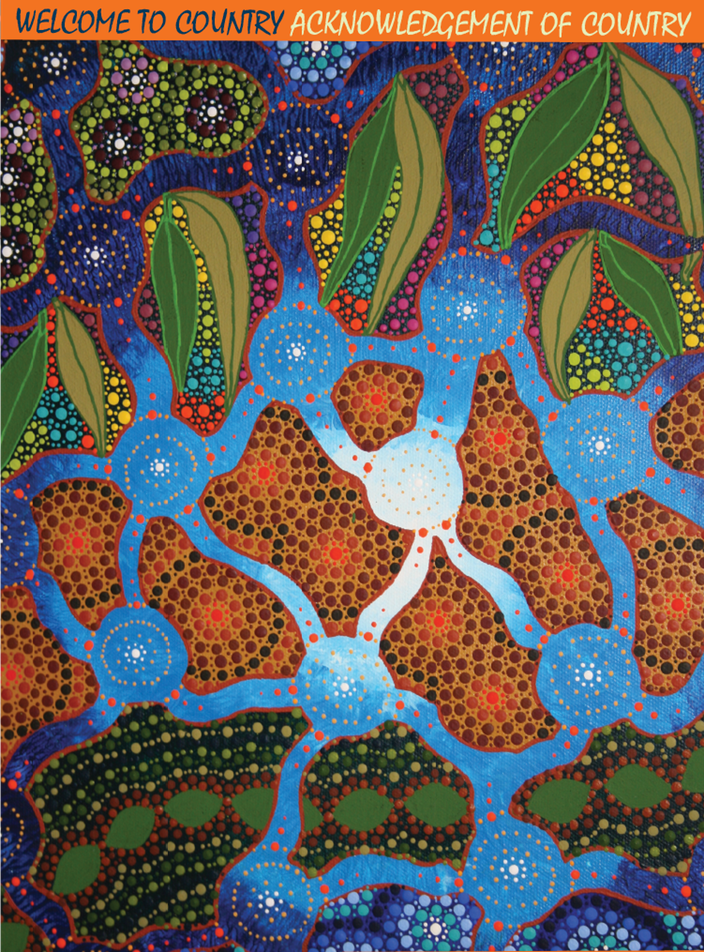The tour concluded at the Prisoners’ Chapel, a symbol of their struggle. The Japanese had purposely wrecked the chapel several times as a means of punishment. Stubbornly, each time the prisoners had rebuilt it. It was a moving experience. As I was leaving the chapel I heard a woman crying in a manner I can only describe as ‘goose bump causing’. I went to her to see if I could help. She sobbed, “I didn’t know this, I wasn’t taught this at school in Japan”.
I had been a history teacher for a large part of my teaching career and I felt that I had always gone above and beyond the textbook version of Australian history, but this experience forced me to reflect. At that moment I had no idea just how much I too had left out.
Years later I came to work at the Koorie Heritage Trust and within a short time I understood the despair of that Japanese woman, more so, because I had been responsible for teaching and overseeing a curriculum which I now know was seriously flawed. I had included Wave Hill but not Cumergunga, Lake Mungo but not Lake Condah, the Freedom Rides but not William Barak and Simon Wonga and Coranderrk, Myall Creek but not the exhaustive list that can be seen on sites listed in the Tuckerbag Resource presented in the Strategic Partnerships Schools Leadership Cultural Competency Program (SPP).
My Aboriginal cultural education mentors informed me that I was not alone. Their incredible knowledge so passionately passed on to me was the genesis of the SPP. Australian history needs to be truthful and respectful. Ignorance is no longer an excuse. I was recently asked, “What are we supposed to teach primary school children - do we have to go back to the negative?” The sanitising attitude is still very strong. The premise of this program is that without the truth there can be no healing, without the truth Dr Mark Rose’s term ‘knowledge apartheid’ continues. We need to share the truth; the untold history. It is also not simply about the negatives of the past but a balance of the positives today seen in a living vibrant culture.
SPP: Building cultural competence
The first two hours of this leadership program is delivered by Rob Hyatt: Education Manager and Cultural Educator. Rob emphasises the importance of culture and the positive effect it has in strengthening identity. Both lead to an optimistic future where health and wellbeing outcomes begin to close the gap between Aboriginal and Torres Strait Islander people and the broader Australian population. For the two decades prior to joining the Koorie Heritage Trust, Rob forged a career in the area of Aboriginal Sport and Recreation. During this time he facilitated a number of youth leadership camps. Because of perceived and actual racism they witnessed or endured in the education arena, many of the youths who attended had varying degrees of difficulty identifying as an Aboriginal person. This program suggests ways identity can be better understood and consequently addressed.
There are simple ways for schools to play their part. This can be achieved by simply displaying all of Australia’s three official flags; a language map; as well as student work indicating they have been studying their local Aboriginal culture. These simple, visual, cues provide a welcoming environment for Aboriginal students and their families.
In addition, the entire school can have a positive experience by engaging with the Elders and local community members sharing their knowledge and experience. This can happen as part of curriculum delivery or during celebration of Aboriginal events such as NAIDOC Week. Respect is something that can be demonstrated through either an acknowledgement of country, or a Welcome by a local Elder for school events. Revisiting the curriculum, in partnership with the local community, will develop culturally accurate material related to the country on which the school stands, and generate better understanding of local history and culture.
Three key focus areas
SPP focuses specifically on three areas. The first is cultural awareness, which provides insight into the history of Australia from an Aboriginal perspective demonstrating its impact on shaping Aboriginal communities today, and their experiences within the education system. The second is cultural competency. This provides educators with confidence, and a culturally authentic curriculum to deliver to Aboriginal students, their families and communities, as well as the broader school community. And finally, cultural safety builds on awareness and competency. This creates the welcoming school environment where students can be supported in their cultural identity.
These three areas are workshopped, then participants are provided with resources through the final third of the program so as to begin to implement this knowledge.
Working with your curriculum
The final hour introduces Tuckerbag, a resource developed to assist curriculum leaders, departmental heads and classroom teachers to implement a program that addresses the Victorian Curriculum (also the Australian Curriculum). This resource has been ratified by The Victorian Aboriginal Education Association. It incorporates and addresses key points in Marrung, the Victorian Education Plan for 2016-2026. Marrung aims to develop a “Victorian community that values and respects Aboriginal and Torres Strait Islander cultures, including through embedding Aboriginal perspectives in the Victorian Curriculum”.
South eastern Australia’s Aboriginal history, culture and country are rich and diverse. Many of the links in Tuckerbag provide curriculum support that point educators in directions that they have previously not been able to access or thought to access. The common positive from participant evaluations is that they will seek to utilise the Tuckerbag resources in future curriculum development.
See our website for information www.koorieheritagetrust.com.au
Reference
Gnokan Dana Murra Kor-ki
(Give me your hand my friend)
Co-authored by Pauline Sloane, Curriculum Development Coordinator and Rob Hyatt, Cultural Education Unit Manager.



































































































































